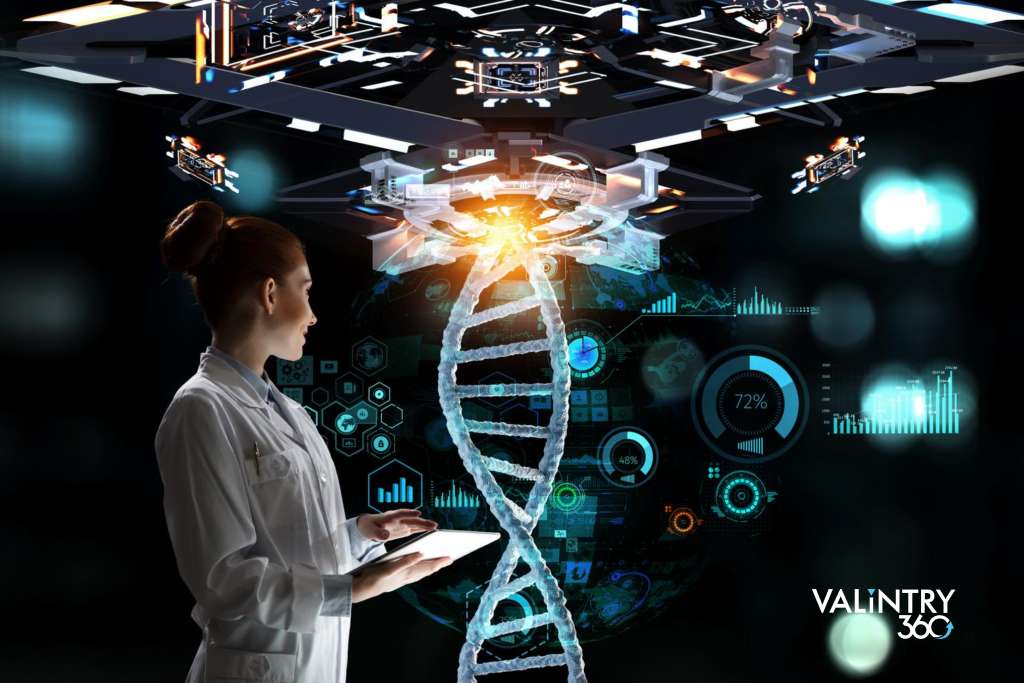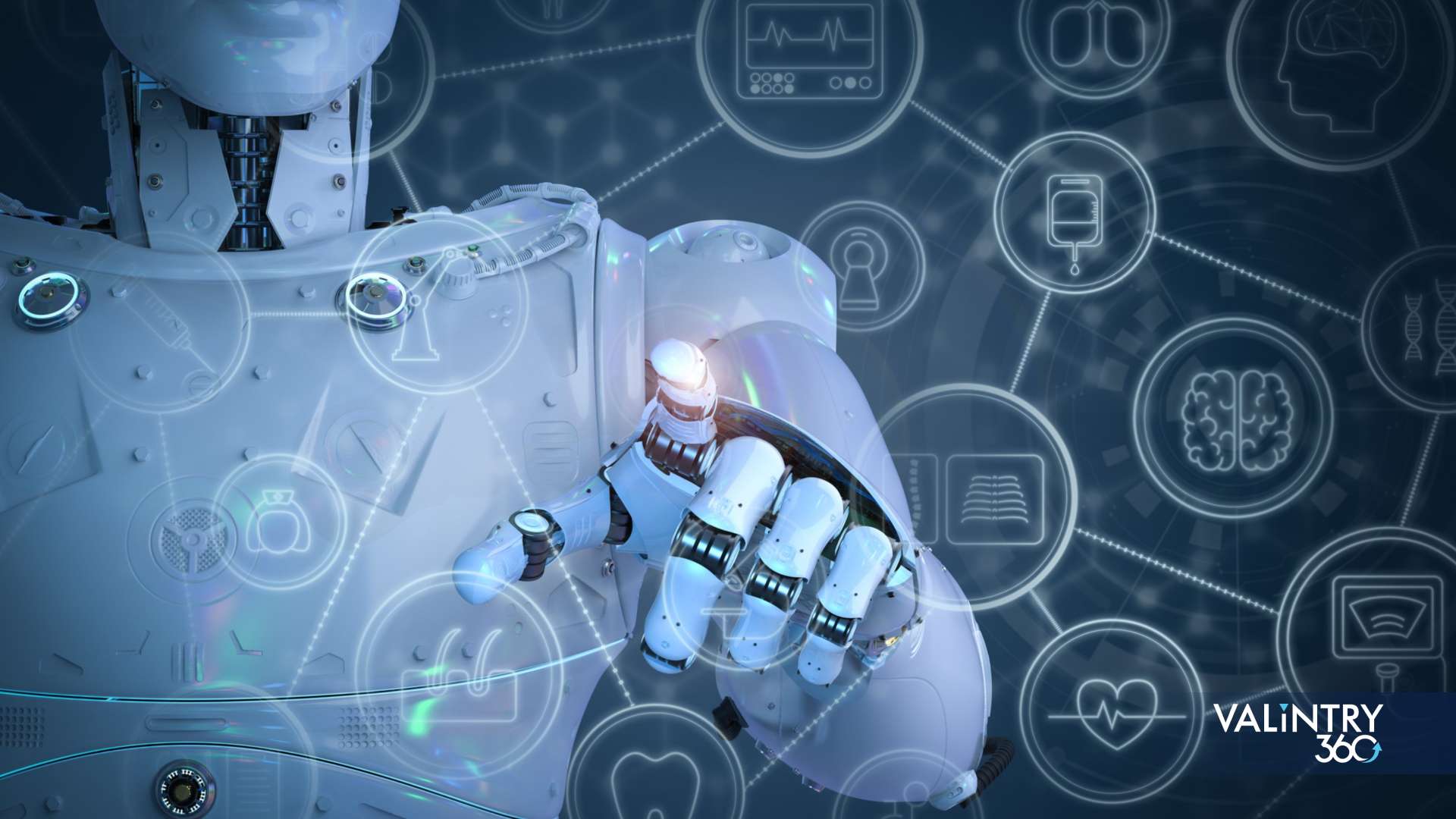
- Healthcare and Life Sciences
Over the past few years, the integration of artificial intelligence (AI) has sparked transformative changes, particularly within healthcare and life sciences. This blog delves into the significant role played by Generative AI in revolutionizing these sectors, its current applications, challenges, future prospects, and how partnering with VALiNTRY360 can optimize its utilization for organizational advancement.
Overview
- The Importance of AI in Life Sciences and Healthcare
- Understanding Generative AI and its Potential
- Exploring Generative AI
- Unique Features of Generative AI
- Operational Mechanisms of Generative AI
- Applications in Life Sciences
- Utilization of Generative AI in Designing Novel Biomolecules
- Personalized Medicine and Targeted Therapies
- Clinical Trials Optimization
- Applications in Healthcare
- Challenges and Considerations
- Future Directions
- In Summary
The Importance of AI in Life Sciences and Healthcare
Artificial intelligence has become a crucial tool for analyzing vast amounts of data, accelerating investigations, and enhancing individualized care in healthcare and life sciences. Its ability to handle complex datasets and identify patterns has led to groundbreaking advancements in disease diagnosis, treatment, and personalized medication.
Understanding Generative AI and its Potential
Generative AI, a subtype of artificial intelligence, aims to create new content or data closely resembling existing ones. Within life sciences and healthcare, Generative AI holds immense potential, enabling innovative breakthroughs in drug exploration, biomolecule development, medical image analysis, and tailored treatment strategies.
Exploring Generative AI
Generative AI utilizes algorithms capable of generating new content, such as images, text, or data, based on learned patterns from a dataset. Unlike traditional AI models focusing on classification or prediction tasks, Generative AI produces original outcomes, mimicking human creativity in devising novel solutions.
Unique Features of Generative AI
While conventional AI algorithms excel at classification and prediction tasks, Generative AI goes beyond by generating new content rather than analyzing existing data. This distinction enables Generative AI to contribute to creative tasks like drug design, where novel molecules must be generated.
Operational Mechanisms of Generative AI

Generative AI operates by leveraging neural networks, specifically generative adversarial networks (GANs) or variational autoencoders (VAEs), to learn underlying patterns in a dataset and generate new samples. GANs consist of two neural networks – a generator and a discriminator – trained simultaneously to produce realistic outputs.
Applications in Life Sciences
Drug Discovery and Development
Generative AI expedites the discovery of new medicines by envisioning molecular structures with desired traits, selecting potential drugs, and refining top candidates. By simulating vast chemical space, Generative AI accelerates the identification of promising molecules for further experimental validation.
Biomolecule Design
Generative AI introduces a new avenue for innovation in designing biomolecules like peptides and antibodies. It enables researchers to generate unique sequences and predict their behavior, potentially engineering molecules with improved effectiveness, precision, and safety, thereby advancing personalized treatment options.
Utilization of Generative AI in Designing Novel Biomolecules
Generative AI algorithms have enabled scientists to rapidly create numerous new types of molecules with diverse shapes. This facilitates efficient exploration of various potential treatments to address medical needs.
Personalized Medicine and Targeted Therapies
By refining biomolecules according to individuals’ genetic blueprints or disease characteristics, advanced AI paves the way for customized medication, tailoring medicines for maximum efficacy and minimal adverse effects.
Clinical Trials Optimization
Generative AI aids clinical research by analyzing past patient data and virtually testing different trial designs. This helps identify patient demographics that may benefit most from a new therapy.
Applications in Healthcare
Generative AI holds significant promise in healthcare, facilitating tasks such as generating synthetic medical images for training and diagnostics, augmenting datasets to enhance machine learning algorithms’ performance, aiding in drug discovery through molecular structure generation, and enabling personalized treatment plans based on patient-specific data.
Challenges and Considerations
Ethical and Regulatory Considerations
As AI technologies advance in healthcare and life sciences, addressing ethical concerns surrounding data privacy, algorithm bias, and patient consent is crucial. Additionally, regulatory frameworks must evolve to ensure the safe and responsible use of AI in medical research and practice.
Interpretability and Trust
Ensuring transparency and interpretability of AI-generated results is essential for building trust among healthcare professionals and patients. Generative AI systems should provide explanations for algorithmic decisions and highlight sources of uncertainty to foster collaboration and confidence in AI-driven healthcare solutions.
Future Directions

Speculation on the Future of Generative AI
As Generative AI evolves, its applications in healthcare and life sciences are expected to expand further, encompassing predictive modeling, drug repurposing, and virtual drug screening. Ongoing research and technological advancements hold the promise of revolutionizing medical innovation and improving patient outcomes globally.
Potential Advancements and Emerging Trends
From multi-modal learning to federated learning, emerging trends in Generative AI offer exciting opportunities for collaborative research, data sharing, and model development in healthcare and life sciences. By harnessing collective intelligence, Generative AI can address complex challenges and accelerate scientific discovery in unprecedented ways.
In Summary
Generative AI stands as a potent tool for transforming healthcare and life sciences, offering innovative solutions for drug discovery, personalized medicine, and patient care. By partnering with VALiNTRY360, organizations can leverage advanced algorithms and vast datasets, paving the way for AI-driven innovations that improve health outcomes and enhance quality of life worldwide.
Related Posts
- Healthcare and Life Sciences
Unlocking Potential with Agentforce: Transforming Health and Life…
Salesforce’s Agentforce is revolutionizing how organizations operate, especially in the Health and Life Sciences sectors. By offering a suite of autonomous AI agents, Agentforce enhances efficiency and improves customer engagement, all while addressing the complexities inherent in healthcare. What is…
- Healthcare and Life Sciences
Transforming Healthcare Claims Processing in Revenue Cycle Management
Healthcare organizations must optimize their revenue cycle management (RCM) processes in the face of complex reimbursement models and rising operational costs. Powerful digital tools like Salesforce’s Health Cloud are transforming RCM, offering advanced features that streamline claims processing and enhance…
- Healthcare and Life Sciences
Salesforce Analytics: Driving Data-Driven Decisions in Health and…
In the rapidly evolving landscape of health and life sciences, the ability to make informed, data-driven decisions is crucial for improving patient outcomes, optimizing operational efficiency, and driving innovation. The integration of advanced technologies such as artificial intelligence (AI), machine…

